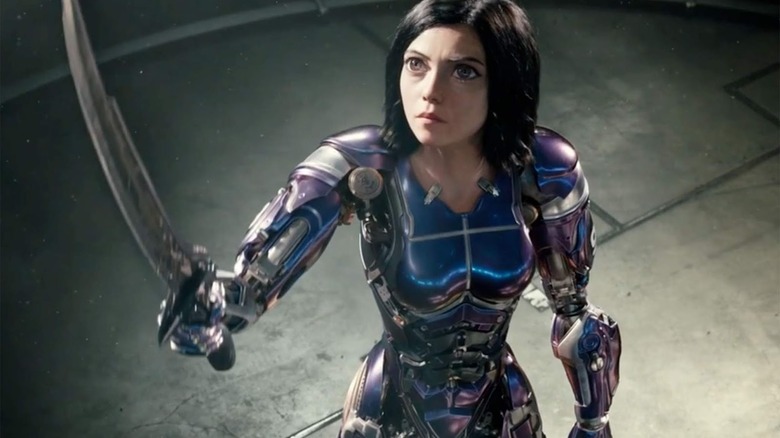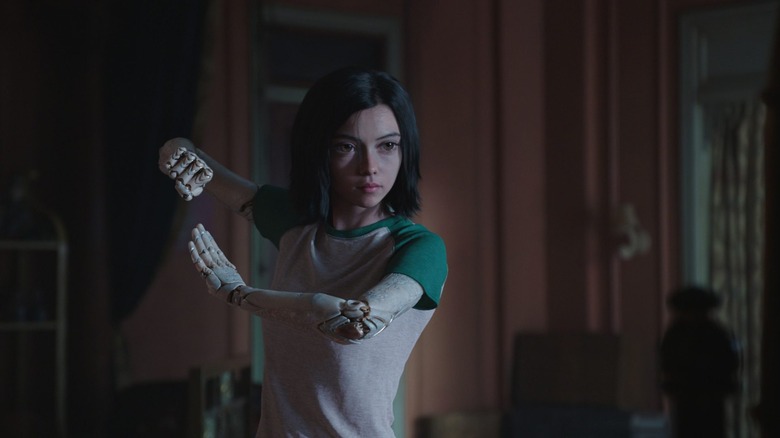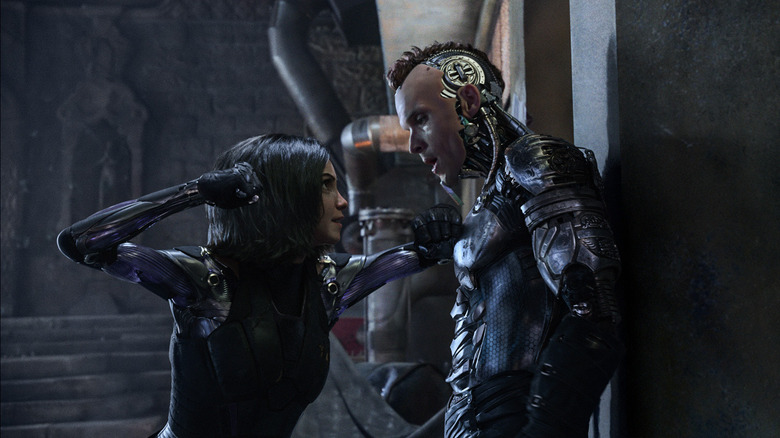James Cameron's Avatar Was A Test Run For Alita: Battle Angel
The cult behind Robert Rodriguez' overwhelmingly expensive 2019 sci-fi epic "Alita: Battle Angel" is small, but incredibly passionate. Heaven help you if you should disparage "Alita" on social media, as the Alita Army (as the fans call themselves) will descend with knives out to defend their object of affection. Among a certain crowd, it is a deeply beloved film.
"Alita," based on Yukito Kishiro's manga series "Gunnm," which ran from 1990 to 1995, was a film that James Cameron had expressed interest in making as long ago as the early '00s, after Guillermo del Toro introduced him to the books. Like all of Cameron's projects, "Alita" was intended to be the Biggest Movie Ever, meant to employ elaborate, cutting-edge special effects to realize the high-tech android Alita and the robots she lives amongst. In a strange creative choice, Alita was to retain a pair of outsize, anime-style eyeballs to make her stand apart from regular humans (and resemble the illustrated version of the character).
According to an interview with the Australian news site news.com.au with producer Jon Landau, "Alita" once presented Cameron with a choice: Make "Alita" in the early 2000s with the technology currently available, or use a different project — "Avatar" — to hone the VFX tech to be used on "Alita." Cameron, as history now proves, went for the latter. As we now all know, "Avatar" consumed the media landscape, and Cameron ended up handing directing duties to Rodriguez.
Project 880
A brief rundown: "Alita" takes place in a distant future wherein human beings regularly replace their own body parts — and sometimes their entire bodies — with robotic parts. The haves live on a floating unreachable city that hovers above the secondary city of have-nots below, where the movie takes place. A mad scientist and part-time bounty hunter (Christoph Waltz) salvages from a scrap heap a severed robot head with a living brain inside. He builds out the robot, names her Alita (Rosa Salazar), and begins teaching her the rules of humanity. Alita has no memory, and has to investigate her identity. The plot eventually extends into robot roller derbies, oblique conspiracies, a villain who can project his consciousness into the minds of others, and space aliens.
According to Landau, "Avatar" — originally codenamed "Project 880" — was the lesser project when compared to "Alita," and he and Cameron agreed that the lesser project ought to proceed the greater, as so doing would allow both the tech and Cameron's own filmmaking acumen to increase:
"When we were making the choice between 'Avatar' and 'Alita' for Jim to direct next, I think we really felt that 'Avatar' would inform 'Alita' more than the other way around and that 'Alita' would benefit more by having another movie under its belt before we tackle her."
"Avatar" was always going to be a mostly digital film, whereas "Alita" was going to be filmed with a CGI title character among real actors. For Landau and for Cameron, that seemed like the more daunting task.
20 years of waiting
As history has now played out, "Avatar" was made first, came out in late 2009, and became an absolute monster. Not only of advanced special effects, but of box office success. "Avatar" ended up costing upward of $237 million, but went on to earn $2.7 billion at the international box office, becoming — adjusted for inflation — the highest grossing film of all time. Cameron's film was as visually impressive as advertised, and the filmmaker eventually decided that living with "Avatar" for the rest of his career might be the way he wants to go. It was eventually announced that Cameron intended to make at least four additional "Avatar" sequels, expanding effect tech and the world of Pandora with each successive film. In 2022, the first sequel is finally nigh.
"Alita," meanwhile, sat on a back burner. After the release of "Avatar," Cameron announced that he was still considering "Alita," but that it wasn't going to be made anytime soon. A staunch environmentalist, Cameron felt that "Avatar" had the more important message. Eventually, Cameron handed to project over to Rodriguez after the latter was able to condense the former's very long screenplay and hundreds of pages of notes into something coherent. By this time, the "Avatar" tech made the original vision of "Alita" visually possible.
Landau explained that many of the delays on "Alita" match the reasons Cameron's own "Avatar" sequel has been delayed: The technology wasn't there yet:
"Alita is a completely CGI character but she fits in seamlessly with the human character who might be caressing her cheek, holding her hand, sharing a chocolate bar with her to eat. We could not have done those things 20 years ago."
"Alita: Battle Angel" is available to stream on Fubo and FX Now. "Avatar: The Way of Water" is due in theaters on December 16, 2022.


